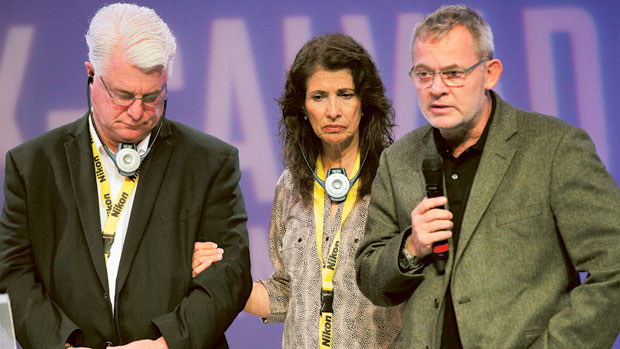
BAYEUX, France: Kidnappings, beheadings, a hatred of journalists: the areas controlled by Daesh have become “black holes” of news where even war-hardened reporters dare not venture.
Speaking on the sidelines of the annual Bayeux-Calvados awards for war correspondents in northwestern France, where three of seven prizes went to coverage of the conflict in Syria, journalists used to danger zones said reporting on areas overrun by militants had become near-impossible.
“We don’t know what is going on in Fallujah, in Ramadi, in Mosul. These are big (Iraqi) cities,” said Jean-Pierre Perrin, a reporter for Liberation daily.
“It’s a war without witnesses.”
As a result, even seasoned war reporters are refusing to go anywhere near the areas where Daesh operates.
Photographer Laurent Van der Stockt, who has received several prizes in the past for his reports in Syria and is known for his contacts on the ground, has said he will not venture into Daesh-held territory.
Jean-Philippe Remy, a journalist for Le Monde daily who travelled to Syria in 2013 with Van der Stockt, said deciding to stay away felt like a “failure”.
“It becomes wickedly complicated when a journalist becomes a prey or... part of a propaganda machine.”
Christophe Deloire, head of Reporters Without Borders, said Daesh kept part of its “myth” going thanks to violence against journalists and general mystery about what goes on in the areas it controls.
As a result, the conflict can “unfortunately only be covered using indirect sources.”
Jon Randal, a globetrotting journalist who spent 30 years at the Washington Post and was this year’s jury president, said he was “very pessimistic.”
“Not only can we not go there but these radical groups have mastered all types of modern media and social networks,” he said of the ability by Daesh militants to use the Internet to spread their message and recruit candidates.
Journalist Medyan Dairieh did spend three weeks embedded with Daesh to report on the group’s self-proclaimed caliphate for Vice News, but the documentary stirred controversy.
“It’s propaganda,” said Van der Stockt.
“We’re verging on activism. Sometimes it looks like Daesh itself filmed,” he added.












